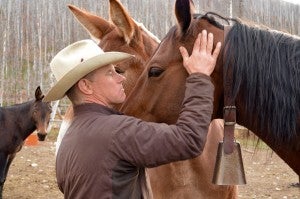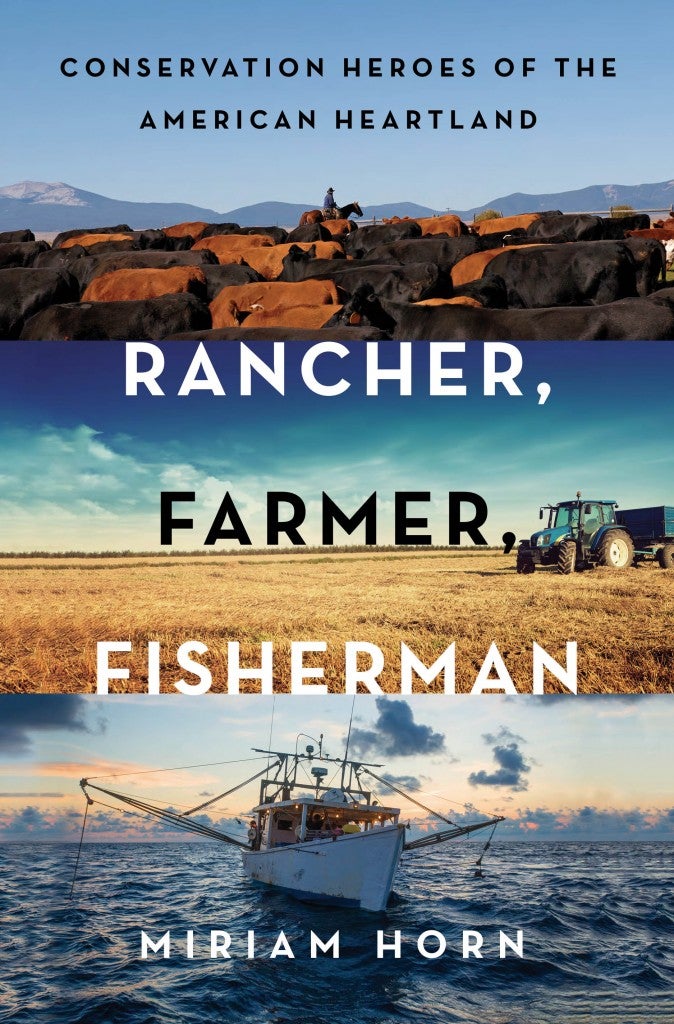
Montana rancher Dusty Crary with his horses.
Western ranchers, Midwestern commodity crop growers, fishermen who make their livelihoods along the Mississippi River and the Gulf Coast. In some circles, these folks wouldn’t necessarily be considered models of sustainability. And yet, many are leading a quiet revolution in the way our food is raised, harvested and produced.
In her new book Rancher Farmer Fisherman: Conservation Heroes of the Heartland, my colleague Miriam Horn journeys down the Mighty Mississippi River System to meet five representatives of this unsung stewardship movement:
- In the northern Rockies, rancher Dusty Crary has wrangled an improbable band of longtime enemies – cattlemen, fisherman, federal land managers, outfitters, hikers, hunters and “greenies” – to protect the sprawling ranches, untamed wilderness and iconic wildlife they all love.
- On the Kansas prairie, “industrial-scale” farmer Justin Knopf is using cover crops and no-till practices to restore depleted soils and increase his wheat and soybean yields. In the process, he’s decreasing harmful fertilizer losses to the air and water, and making his crops more resilient to climate change.
- On the Mississippi, Canal Barge Chief Executive Merritt Lane has joined an unprecedented effort to restore the river’s natural land-building functions in the Delta. It will help protect his mariners and the country’s most important shipping artery, which facilitates 60 percent of America’s grain exports.
- On the Louisiana bayou, Sandy Nguyen is fighting to keep alive the estuaries that harbor the shrimp and oysters her immigrant community relies on, and which help to protect Louisiana’s coastal residents from rising sea levels.
- And on the deep waters of the Gulf, commercial fisherman Wayne Werner is tangling with federal regulators to bring back red snapper, which will help supply local restaurants with a favorite dish and keep his buddies’ businesses afloat.
Busting myths
 In telling their stories, Horn challenges pervasive myths about Americans and environmental values. These myths hold that in these traditional and deep-red states, heartland Americans – people who run tractors, barges and fishing boats; and who attend church and town meetings – are hostile to environmental values.
In telling their stories, Horn challenges pervasive myths about Americans and environmental values. These myths hold that in these traditional and deep-red states, heartland Americans – people who run tractors, barges and fishing boats; and who attend church and town meetings – are hostile to environmental values.
According to this belief, Big Ag is inherently destructive of nature, local organic is the only solution, and America is trapped in ever-more-hostile warring political camps.
The truth is, the people in Miriam’s book are like the hundreds of ranchers, farmers and fishermen Environmental Defense Fund has partnered with over the years. They are conservationists because their professions and communities live or die by the natural resources they ply.
They understand that if we’re going to meet growing needs for food, water and shelter in a changing climate, they’ll need to employ practices that improve, rather than harm, the ecosystems that sustain us.
“The foundation of democracy”
As a group, they’re also more aware than most of us of their connection to their neighbors and the larger world, Miriam says.
“The water from Justin’s Kansas farm winds up in the Gulf where Wayne fishes. The ducks Dusty hunts on the lakes near his Montana ranch spend their winter in Louisiana’s estuaries,” she says.
That interdependency has required all of them to learn how to work things out with people very different from themselves, even sometimes with long-time adversaries – which is, of course, the foundation of a democracy.”
We cannot win the fight to preserve our natural heritage and our food supply without the people in Miriam’s book.
My hope is that Rancher Farmer Fisherman will help change the national conversation about what it means to be an environmentalist and re-establish conservation as a core American value.
Related:
How coastal restoration in Louisiana is helping rural communities in the Midwest >>
Meet the farmer who helped make no-till the norm in north central Montana >>
What would it take for a Nebraska corn farmer to grow milkweed for monarch butterflies? >>










One Comment
The best ecological and sustainable food
trend is stop using animals for food. They are not necessary for food and cause also many times more calories are used in animal production than ever used by humans so it is extremely inefficient! It pollutes the world!